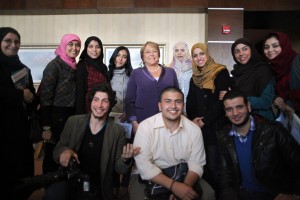UN Women Executive Director visits Libya to strengthen women’s engagement in upcoming elections and transition process
Date:
UN Women Executive Director Michelle Bachelet travelled to Libya on 11 and 12 March to meet with leaders and strengthen UN advocacy and engagement in support of Libyan women's meaningful engagement in the transitional process.
She addressed a forum with youth and civil society on the role of women in politics, including the electoral process, a topic of great interest given the pending first democratic elections in Libya. Special attention was focused on supporting Libyan women as voters and candidates in the upcoming elections for the National Congress, which are anticipated for late June.

UN Women Executive Director Michelle Bachelet poses with audience members following a forum with youth and civil society in Tripoli, Libya on Monday 12 March 2012. UN Photo/Iason Foounten
During her visit, Ms. Bachelet met with the Chair of the National Transitional Council, the interim Prime Minister Abdel-Raheem al-Keib, the Minister of Social Affairs, leading public figures and representatives of civil society.She also met with the Special Representative of the UN Secretary-General, Ian Martin, and the Deputy Special Representative, Georg Charpentier, and colleagues of the UN Special Mission in Libya (UNSMIL) and the UN Country Team to discuss the situation and the upcoming elections to elect representatives charged with developing Libya's new constitution. Both processes provide a critical window of opportunity to support women's meaningful engagement in the transition and for their needs, rights and aspirations to be heard and upheld in constitution.
The visit of the UN Women Executive Director to Libya was focused on strategic dialogue with leaders in government, the United Nations and civil society to address the spectrum of transitional challenges and the engagement of women as the nation prepares for elections and the new constitution.